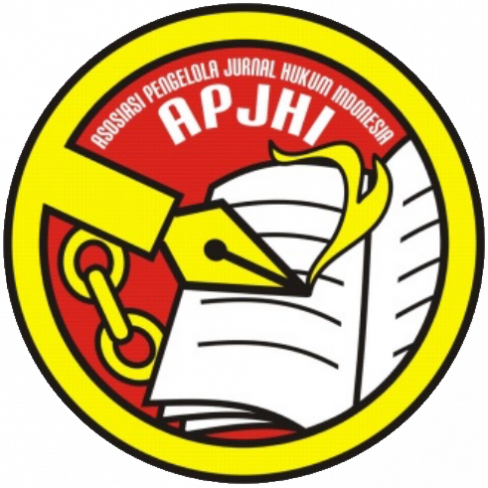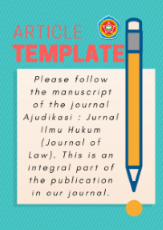Analisis Perubahan Ketiga Undang-Undang Mahkamah Konstitusi Ditinjau dari Perspektif Pembentukan Peraturan Perundang-Undangan Di Indonesia
DOI:
https://doi.org/10.30656/ajudikasi.v6i2.4464Keywords:
Analysis, Amendment, Regulatory, Constitutional CourtAbstract
The third amendment to the Constitutional Court Act drew a lot of criticism, especially regarding the urgency of the change, considering that the Constitutional Court Law is not included in the priority prolegnas in 2020. There are two issues of the third amendment to the Constitutional Court Law that are highlighted in this article, namely, The Material Analysis of the Third Amendment to the Constitutional Court Law is based on the Regulation on the Formation of Laws and Regulations and the Formal Analysis of the Third Amendment to the Constitutional Court Law In terms of the Law on the Formation of Laws and Regulations. The research method used is a type of normative research. The approaches used in this study are the statute approach, case approach and concept approach using prescriptive analysis. The results of the analysis show that (1) Materially, the Third Amendment to the Constitutional Court Law is based on the Regulation on the Establishment of Laws and Regulations, it is noted that the Third Amendment to the Constitutional Court Law has defects in its amendments, namely regarding the minimum limit of age to be able to become a constitutional judge and regarding the abolition of the period of periodization of constitutional judges which is considered contrary to the constitution or unconstitutional. and (2) Formally, the Third Amendment to the Constitutional Court Law In view of the Law on the Establishment of Laws and Regulations of the Constitutional Court Law, the third amendment has been formally flawed in its amendments, where there are several provisions that are not in accordance with the format of preparation as intended in Law Number 12 of 2011 jo Law Number 15 of 2019 concerning the Establishment of Laws and Regulations (P3 Law).
Downloads
References
Buku :
Butarbutar, Elisabeth Nurhaini, 2018, Metode Penelitian Hukum, PT Refika Aditama, Bandung.
Eddyono, Sri Wiyanti (edit), 2020, Kertas Kebijakan Catatan Kritis Terhadap UU No 11 Tahun 2020 Tentang Cipta Kerja, UGM, Yogyakarta.
Efendi, Jonaedi dan Johnny Ibrahim, 2018, Metode Penelitian Hukum Normatif dan Empiris, Pranadamedia Group, Depok.
MD, Moh. Mahfud, 2018, Politik Hukum di Indonesia, PT RajaGrafindo Persada, Depok.
S., Maria Farida Indrati, 2017, Ilmu Perundang-Undangan 2: Proses dan Teknik Pembentukannya, Kanisius, Yogyakarta.
Soejono dan H. Abdurrahman, 2003, Metode Penelitian Hukum, Rineka Cipta, Jakarta.
Artikel/Jurnal :
Bisariyadi, “Yudisialisasi Politik dan Sikap Menahan Diri: Peran Mahkamah Konstitusi dalam Menguji Undang-Undang (Judicialization of Politics and Judicial Restraint: The Role of the Constitutional Court on the Review of Laws), Jurnal Konstitusi, Volume 12, Nomor 3, September 2015.
Doly, Denico dan Noverdi Puja Saputra, “Politik Hukum Undang-Undang Tentang Perubahan Ketiga Atas Undang-Undang Nomor 24 Tahun 2003 Tentang Mahkamah Konstitusiâ€, Jurnal Kajian Singkat Terhadap Isu Aktual Dan Strategis, Volume XII, Nomor 17/I/Puslit/September/2020.
Omara, Andy, “Interpreting The Indonesian Constitutional Court’s Approach In Conducting Judicial Review In Cases Related To Economic And Social Rightsâ€, Indonesia Law Review, Volume 7, Number 2, May - August 2017.
Rishan, Idul, “Konsep Pengujian Formil Undang-Undang di Mahkamah Konstitusi (The Concept of Judicial Review of the Legislative Process in the Constitutional Court)â€, Jurnal Konstitusi, Volume 18, Nomor 1, Maret 2021.
Peraturan Perundang-Undangan :
Undang-Undang Nomor 24 Tahun 2003 tentang Mahkamah Konstitusi (Lembaran Negara Republik Indonesia Tahun 2003 Nomor 98, Tambahan Lembaran Negara Republik Indonesia Nomor 4316).
Undang-Undang Nomor 8 Tahun 2011 tentang Perubahan atas Undang-Undang Nomor 24 Tahun 2003 tentang Mahkamah Konstitusi (Lembaran Negara Republik Indonesia Tahun 2011 Nomor 70, Tambahan Lembaran Negara Republik Indonesia Nomor 5226).
Undang-Undang Nomor 12 Tahun 2011 tentang Pembentukan Peraturan Perundang-Undangan (Lembaran Negara Republik Indonesia Tahun 2011 Nomor 82, Tambahan Lembaran Negara Republik Indonesia Nomor 5234).
Undang-Undang Nomor 15 Tahun 2019 tentang Perubahan atas Undang-Undang Nomor 12 Tahun 2011 Pembentukan Peraturan Perundang-Undangan (Lembaran Negara Republik Indonesia Tahun 2019 Nomor 183, Tambahan Lembaran Negara Republik Indonesia Nomor 6398).
Undang-Undang Nomor 7 Tahun 2020 tentang Perubahan Ketiga Atas Undang-Undang Nomor 24 Tahun 2003 Tentang Mahkamah Konstitusi (Lembaran Negara Republik Indonesia Tahun 2020 Nomor 216, Tambahan Lembaran Negara Republik Indonesia Nomor 6554).
Sumber Lainnya :
Putusan Mahkamah Konstitusi Nomor 7/PUU-XI/2013.
Putusan Mahkamah Konstitusi Nomor Nomor 91/PUU-XVIII/2020 Perihal Perkara Pengujian Formil Undang-Undang Nomor 11 Tahun 2020 tentang Cipta Kerja terhadap Undang-Undang Dasar Negara Republik Indonesia Tahun 1945.
Ringkasan Permohonan Perkara Nomor 90/PUU-XVIII/2020 tentang “Pengaturan Syarat Usia Minimal Pengangkatan Hakim Konstitusi dan Penghapusan Periodisasi Masa Jabatan Hakim Konstitusiâ€.
Dewan Perwakilan Rakyat Republik Indonesia, https://www.dpr.go.id/uu/prolegnas-long-list, diakses pada 21 November 2021.
Downloads
Published
Issue
Section
License
Authors who publish with this journal agree to the following terms:
Authors retain copyright and grant the journal right of first publication with the work simultaneously licensed under a Creative Commons Attribution License that allows others to share the work with an acknowledgment of the work's authorship and initial publication in this journal.
Authors can enter into separate, additional contractual arrangements for the non-exclusive distribution of the journal's published version of the work (e.g., post it to an institutional repository or publish it in a book) with an acknowledgment of its initial publication in this journal.
Authors are permitted and encouraged to post their work online (e.g., in institutional repositories or on their website) before and during the submission process, as it can lead to productive exchanges and earlier and greater citation of published work.
All articles in Ajudikasi : Jurnal Ilmu Hukum can be disseminated provided they include the identity of the article and the source of the article (Ajudikasi : Jurnal Ilmu Hukum). The publisher is not responsible for the contents of the article. The content of the article is the sole responsibility of the author
Ajudikasi : Jurnal Ilmu Hukum is lincensed under a Creative Commons Attribution-ShareAlike 4.0 International License.










1.png)
.png)
.png)





.png)
.png)
.png)
.png)





.png)







